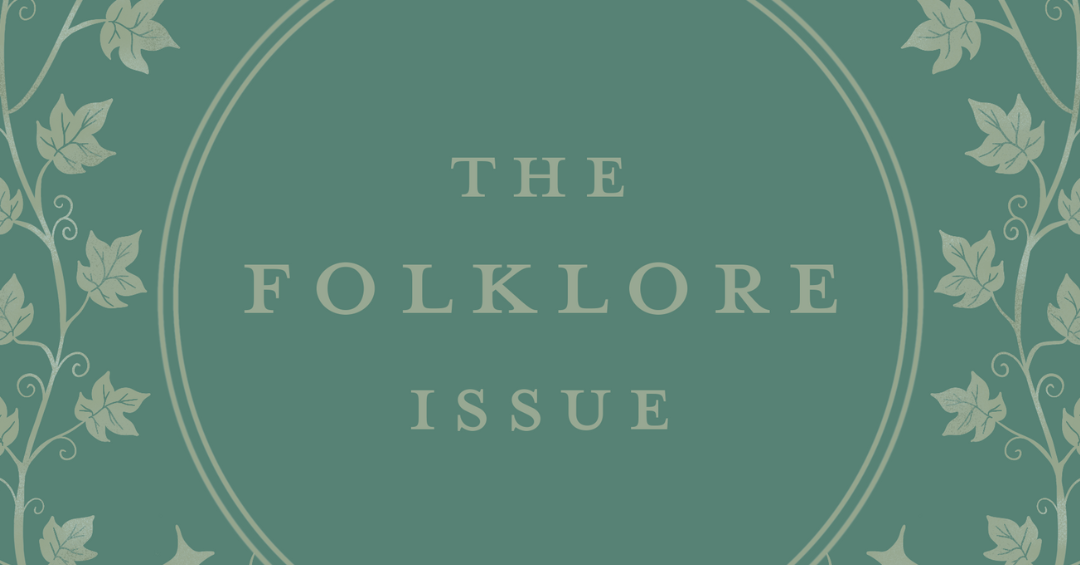I wish I could say there was a more compelling reason why Folklore is the theme for our first (official) issue, but truthfully it was the result of going down a Wikipedia rabbit hole whilst researching Scottish folklore and not being able to climb back out of it. The knowledge that these myths, passeddown simply by word of mouth and illustrations, have stood the test of time is as fascinating as it is bewildering (evidence of the Loch Ness Monster legend quite incredibly dates back to drawings created by the Picts in the Early Middle Ages). And though rich in folklore, Scotland’s kelpies, selkies and banshees only cover the most minute fraction of folk tales that exist across the world. Clearly, as humans, we have always possessed an innate ability to be storytellers.
When we launched our pilot edition of Glyph., we were overwhelmed by how many of you were out there, wanting to share and pass down your stories to others. Folklore therefore seemed like a perfectly fitting way to invite others into our little writing community. We wanted to bring writers together across borders and languages and culture, to pick up their pens and share the tales that have followed them from shadowed corners of the globe, or the brand new myths they’ve created themselves.
We wanted to bring writers together across borders and languages and culture, to share the tales that have followed them from shadowed corners of the globe, or the brand new myths they’ve created themselves.
The following anthology of stories stretches from the most fantastical to the eerily plausible. In ‘Wild Man’ and ‘Incense’, we revisit the repressed tales from childhood that will forever find a way to haunt you. Though vastly different in setting and culture, they both masterfully capture that universal feeling of unease. And sometimes we cannot help but be equally curious about that thing that terrifies us the most, as Rebecca King portrays in ‘The Door’. Towards the more divine end of our folklore spectrum, ‘Achilles’ Choice’ and ‘Artemis’s Blasphemy’ take us to Ancient Greek territory that feels refreshingly modern, exploring the forever relevant conflict between love and duty.
Despite the majority of the stories in this collection taking place in universes that are not quite our own, the characters within them are experiencing issues we are all too familiar with—ones that are being passed down through generations in the same manner that folktales themselves are. Both Tess in ‘Dirty Laundry’ and Alasdair in ‘What You Are’ find themselves suffering because those that are more powerful are the ones who get to decide what is right and wrong. The two stories cover totally dissimilar themes, with Tess embodying female resilience and Alasdair grappling with his true self—but, in the end, it is the unjust that will perish in the hands of vengeful entities.
‘She Who Sold The Fish Scales’ also finds a character seeking assistance from a mythical being, but do not be fooled by its fairytale-like title and rhythm, the short piece is wonderfully unsettling. Our narrator in ‘The Hibernating Dead’, however, takes matters into her own hands, as Lia Mulcahy expertly weaves a tale that is dark and haunting, but ends with a sliver of hopefulness, of a new start. A similar notion is echoed in ‘Learning To Walk In The Dark’, a piece inspired by the haminja luck spirits of Norse mythology. And for those seeking folklore of the lighter, more comical kind, ‘The Godfather of Garden End’ offers a quick-witted fairytale that follows two particularly crafty pixies—who I hope we get to hear more from in the future.
This is a special anthology—I’m aware that we’re completely biased—but we really feel that it showcases the work of some incredibly talented writers, and although they work together cohesively and thematically, all eleven stories are brilliantly unique.
Enjoy all at once, or savour slowly. Just remember to pass them down.
